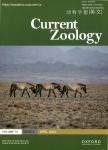Community responses to extreme climatic conditions
Community responses to extreme climatic conditions作者机构:Centre de Recherches sur la Biologie des Populations d'Oiseaux UMR 7204 MNHN-CNRS-UPMC CP 51 Museum National d'Histoire Naturelle 55 rue Buffon F-75005 Paris France Biodiversity Department Forest Technology Centre of Catalonia Pujada del Seminari s/n E-25280 Solsona Spain Institut des Sciences de l'Evolution UMR CNRS-UM2 5554 Universite Montpellier 2 F-34095 Montpellier Cedex 05 France
出 版 物:《Current Zoology》 (动物学报(英文版))
年 卷 期:2011年第57卷第3期
页 面:406-413页
核心收录:
学科分类:0710[理学-生物学] 07[理学] 070703[理学-海洋生物学] 08[工学] 081302[工学-建筑设计及其理论] 0707[理学-海洋科学] 0905[农学-畜牧学] 0906[农学-兽医学] 0813[工学-建筑学]
主 题:极端气候条件 社区 极端气候事件 海洋生态系统 生物学参数 动物群落 气候变化 严重程度
摘 要:Species assemblages and natural communities are increasingly impacted by changes in the frequency and severity of extreme climatic events. Here we propose a brief overview of expected and demonstrated direct and indirect impacts of extreme events on animal communities. We show that differential impacts on basic biological parameters of individual species can lead to strong changes in community composition and structure with the potential to considerably modify the functional traits of the community. Sudden disequilibria have even been shown to induce irreversible shifts in marine ecosystems, while cascade effects on various taxonomic groups have been highlighted in Mediterranean forests. Indirect effects of extreme climatic events are expected when event-induced habitat changes (e.g. soil stability, vegetation composition, water flows altered by droughts, floods or hurricanes) have differential consequences on species assembled within the communities. Moreover, in increasing the amplitude of trophic mismatches, extreme events are likely to turn many systems into ecological traps under climate change. Finally, we propose a focus on the potential impacts of an extreme heat wave on local assemblages as an empirical case study, analysing monitoring data on breeding birds collected in France. In this example, we show that despite specific populations were differently affected by local temperature anomalies, communities seem to be unaffected by a sudden heat wave. These results suggest that communities are tracking climate change at the highest possible rate.



